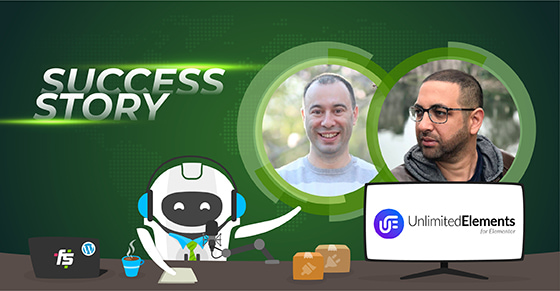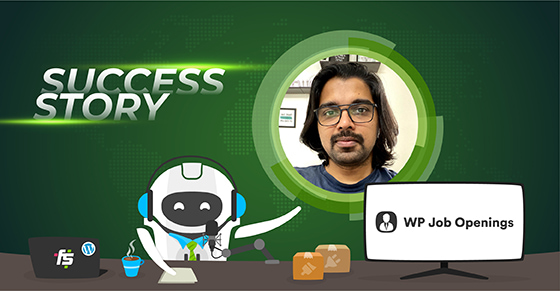|
|
Don’t discount your hobbies because there’s always a chance they could lead to greater things. For Tobias Bäthge, the success of TablePress — the top WordPress table plugin — is proof that recreational pursuits can often serve as platforms to launch fulfilling full-time careers. Let’s dive into the success story of TablePress:
Hi Tobias — welcome and thanks for joining us! Tell us about yourself, where you’re from, and what you do on your days off.
Thanks for having me! I’m Tobias, a WordPress plugin developer from Magdeburg, Germany, and the creator of TablePress, the most popular and highest-rated WordPress table plugin.
When I’m not coding, I enjoy playing with my kids, doing some gardening with my wife, or playing baseball with my hobby team.
Why WordPress? Tell us about your journey up until now and where you see it progressing.
I started with WordPress in the summer of 2006 (it was WP 2.0, I believe). At the time, blogging was on the rise so I decided to get in on the trend, using WordPress as a sort of daily journal to document my first year of college (as ‘real life’ took over, this only lasted a couple of months).
My next foray into the World of WordPress was using it for my hobby baseball team’s new website. As I had experience from my personal blog, I volunteered to build a new website for the team so that we could reach our fans (well, at least parents and friends of our team members 😅 ) and potentially attract new players.
Today, I use WordPress for several small project websites and I contribute to WordPress Core now and then. The bulk of my time is spent working on my WordPress table plugin TablePress.
Thanks for the segue, Tobias 😁 As you mentioned, TablePress is the most popular, highest-rated WordPress table plugin. What was your ‘lightbulb’ moment and what made you prioritize it over other product ideas?
Essentially, TablePress was born out of my personal needs. For the baseball site, I needed a way to show and manage a large number of tables for each season’s rosters, schedules, standings, statistics, etc.
While I could have accomplished this with HTML tables directly, it wasn’t feasible as I wanted other team members to be able to easily edit content as well. After some searching, I found a WordPress table plugin with limited features and several issues, not to mention the fact that the developer was no longer maintaining it.
This was the motivation I needed to try my hand at coding and, in early 2009, WP-Table Reloaded was born. It got popular fast and reached 50,000 active installations at its peak, but I quickly learned that I’d made some unfortunate design decisions in the code base. This meant I had to completely rewrite my WordPress table plugin and incorporate everything I’d learned and experienced along the way. Even so, my mistakes were a blessing in disguise as I wanted to rename the product because people got ‘WP-Table Reloaded’ wrong all the time.
In late 2011, TablePress became a reality. But up until the end of last year, it was a hobby for me (albeit a very important one). Over the years, I continuously spent time developing and supporting the product. If I were to guess, the reason for its popularity was because it did what it promised and there was no WordPress table plugin alternative of similar quality on the market. But popularity doesn’t equal revenue, and even though it was nice to receive donations from happy customers, it wasn’t nearly enough to earn a living.
But when personal circumstances allowed, I took the chance to develop and publish premium versions of TablePress at the end of last year. These now allow me to work on something I love full-time to provide the best WordPress table plugin for people to enjoy.
These now allow me to work on something I love full-time to provide the best product for people to enjoy.
What is the main pain point that TablePress is addressing and what’s the ‘secret sauce’ that makes people choose it over competitors?
In a nutshell, TablePress allows a site owner to easily add attractive, interactive data tables to their website. Not only does it offer a more sophisticated user experience than, say, the old table tool in the WordPress visual editor (TinyMCE) or the Table block in the block editor, but it also offers features on top of that, like making tables sortable and searchable by site visitors.
With TablePress, my goal is to have a WordPress table plugin that does only one thing, but it does that one thing brilliantly. This mentality is why I’ve been reluctant to add feature requests from users — if I feel like they won’t benefit the majority of users and they’ll add a big maintenance burden for me, I don’t consider them.
With TablePress, my goal is to have a plugin that does only one thing, but it does that one thing brilliantly
This is why TablePress lacks the special (extra) features that other WordPress table plugins have, but it’s also why people find the product so intuitive and easy to use. My educational background is in control engineering which has helped me employ a ‘systems’ approach — data flows into a process, is modified in some way, and then creates some output again.
You’re an indie developer — what’s it like? Pros and cons?
Before starting my journey as a self-employed developer some months ago, I’d only been employed in ‘safe’ job positions (like pretty much all of my immediate family). Because of this, I didn’t have a ‘role model’ for advice about self-employment or founding a business. That’s probably also part of the reason I didn’t try this much earlier. But now, I’m not looking back!
The advantages of being able to work from home, organize my time as freely as I want, and spend time with my kids and wife (and cats) are life-changing! Sure, there is financial risk in the beginning — you don’t know if your idea will work out and you are now responsible for everything yourself. Plus, there’s no one telling you what to do or how to do it anymore.
The advantages of being able to work from home, organize my time as freely as I want, and spend time with my kids and wife (and cats) are life-changing!
But for me (and I’m sure many others), the benefits far outweigh the concerns.
Eventually, an indie dev with a successful product and growing user base (like yourself) may need to look for extra hands. Do you have any plans to hire and grow a team?
At the moment, I’m able to get the work done by myself, but getting help or even growing a team is certainly on the cards. Reaching a certain growth level will likely necessitate that. For example, the support load may become so time-consuming that maintenance or development of new features suffers. Those are the indicators I’ll be looking out for, and it’ll be the time when hiring those ‘extra hands’ will have a great impact.
Speaking of impact, TablePress has 800,000+ active installs on WP.org, 5-star reviews all around, and 12 million+ downloads! I’d say it’s made its mark 😉 What’s contributed most to your product’s success and what features set you apart from competitors?
A big part of TablePress’ high numbers and success can likely be attributed to its early start in 2009. There were simply far fewer WordPress table plugins in the directory back then, so visibility was higher and TablePress was able to get a head start over the WordPress table plugins that arrived later. That said, I also believe TablePress’ longevity can largely be attributed to the ‘blood, sweat, and tears’ I’ve put into it. I believe these continuous updates and improvements have convinced many users over the years.
I’ve also always put great emphasis on code stability and on providing fast, precise support in the WordPress support forums. This attentiveness has heavily contributed to users giving TablePress positive reviews, which is obviously great for marketing, etc. Also, to reiterate what I said earlier: it’s not the sheer quantity of offered features but their quality that convinces people to place their trust in TablePress — many with business-critical data.
What does a typical ‘business day’ routine look like for you?
To be honest, I don’t really have a ‘typical’ day when it comes to what I work on. That said, the time routines are pretty standard:
I enjoy having breakfast with our kids before taking them to kindergarten. Then, I’ll start my first work session where I usually check out the support requests that came in overnight. Once that’s done, I’ll move on to coding — sometimes smaller tasks, like code quality improvements, and sometimes bigger projects, like new features. In the early afternoon, I’ll probably do some more coding or research and exploration before enjoying the rest of the day with my family.
When the kids are in bed, I’ll do another round of support or some ‘light’ work, like reading or catching up on WordPress news.
Let’s move on to marketing. There’s no doubt solopreneurs are aware of its value but many choose to put it off in favor of product dev, etc. Have you dabbled in marketing at all?
This is rather difficult to answer as I’m not a marketing guy and I’m fortunate with the natural growth that TablePress has experienced since its release. I think — first and foremost — a stable product with quality support is what attracts users and retains them. If I were to guess, too many product owners invest heavily in getting new users but then fail to turn them into long-term users. If you provide a solid product and people find that they can trust your product (and you as a developer) they will use it and recommend it to their peers.
Like marketing, SaaS can expose your product to bigger audiences. Do you have any plans to turn TablePress into SaaS?
That’s not something I envision for TablePress, to be honest (at least with data). I think data should stay with the user and not be vendor-locked or something like that. So instead of looking into how I can get the user’s data on my servers and have them pay for getting it back on their website, I’d much rather focus on making TablePress better as a product.
Sure, implementing certain ‘service features’ on an external server instead of making them part of the plugin code could be doable, but I don’t have plans for that at the moment. SaaS definitely is attractive from an economic standpoint, but it also brings so many more challenges.
And when you consider the complexities of product development, challenges are the last thing an indie dev wants 😅 What advice do you have for product makers who are just beginning their journeys?
My recommendation is to focus on what makes your product unique over ‘copying’ an alternative, existing product. Sure, researching competitors and learning what they do is a must, but I think it’s more important to develop a vision for your product and stick to it. Don’t add features for the sake of adding features; add them because they are needed and used by your audience.
Researching competitors and learning what they do is a must, but I think it’s more important to develop a vision for your product and stick to it.
The other recommendation is to just get started and make your product! This was probably my first key takeaway after finally deciding to found a business around my hobby. I should have done it much earlier.
With a WordPress plugin, the business risk is usually rather low. It’s not like you have to rent office space, buy raw materials up front, have logistics and a warehouse, or even employees. You can typically start it as a side gig, with flexible work times, and then increase the level of ‘how much you are into it’ once you see what comes from it.
While software product makers don’t typically need to rent office space, you do need your trusted ‘tools of the trade’. What does your dev environment look like?
Probably nothing too special (and maybe even disappointing 😂) but here goes:
Through the years, I’ve used several setups. I think I started with something like MAMP on Windows before switching to a Vagrant-based setup on Mac and then finally settling on Docker. With that, I just spin up some NGINX, MariaDB, and PHP containers. Locally, I run things like Composer and npm for some tooling, and I prefer Visual Studio Code and Sublime Text for code editing. All code is kept in Git repositories — mainly GitHub and Bitbucket — which I manage using Sublime Merge.
Nice (and not disappointing at all)! Following on: which devices can you not do without and why?
I’m using a MacBook Pro (still Intel® Silicon), usually with an external keyboard, mouse, and monitor. Not long ago, I upgraded to a bigger 4K screen which makes working on a computer for long hours more pleasant. I also bought a standing desk last year and I switch between sitting and standing regularly. Not only has this helped with back pain issues, but it even allows me to work on TablePress while carrying our toddler in a baby carrier for her naps!
From infants to (product) adulthood — What made you turn your WordPress table plugin into a business?
A multitude of things, actually. I have regularly been asked by (business) users whether professional support and things like that are available. This makes sense because companies don’t want to invest time and effort to implement a ‘hobbyist project’ into their workflows without knowing if that project will still exist next month.
I also identified that the demand and potential were there, given the number of active installations that TablePress has. While the idea of making a business out of my hobby had been lingering in my head for some time, I still had doubts about it, such as:
- Should I quit my relatively safe job as a research associate and dive into uncharted, more volatile waters?
- Will the administrative hassle a business owner faces take away all the fun?
But when some of these decisions essentially made themselves — in particular, related to personal family life, my job situation, and finding Freemius as a solution for that administrative hassle — I took the chance!
What made you choose Freemius?
Whenever I thought about developing premium versions for TablePress to sell as a business, I feared all of the extra stress that comes with it:
- the hassle of different VAT rates for customers, as I live in the European Union
- customer data on my servers, maybe even with payment information.
- setting up an online shop with a licensing and updates system, etc.
I didn’t want to deal with the above myself. Not only would it be time-consuming (and take me away from improving TablePress as a product), but it would also create this subliminal stress every day: Did I write that invoice to that other country correctly? Is my server running smoothly? Is my customer data safe? Etc.
Yes, there are good self-hosted solutions available, like Easy Digital Downloads and the many add-ons it has. It might also be the cheapest solution, but many of my fears would still not be remedied and I would have had to invest a lot of my precious time into setting things up. So EDD was never really an option for me. In addition, I had seen the possibilities that payment providers like Stripe offer, but they weren’t yet sufficient for me.
That’s when I discovered Freemius, and I was instantly convinced that the ‘Merchant of Record’ approach would solve many problems for me and my business:
- I wouldn’t have to deal with all of those taxes
- There’d be no need to invest hours and hours into implementing a licensing and updates mechanism, etc. I could just concentrate on TablePress 💥
When compared to Gumroad, Lemon Squeezy, and similar services that act as a Merchant of Record, the fact that Freemius is tailored to WordPress made things like the SDK integration very easy.
To support my intuition, I reached out to fellow developers who had faced similar decisions in the past — they all shared positive experiences with Freemius. Vova Feldman (Freemius founder and CEO) also had some super helpful tips, which made me feel very comfortable with my decision.
Subscribe and grab a free copy to start Mastering SEO on the WordPress.org Repository
Make the WordPress.org search algorithm work for you with actionable tips to rank your plugin higher.

That’s awesome to hear, Tobias. What Freemius features do you enjoy the most?
I don’t think I’ve even tried out everything Freemius has to offer (yet), but the feature I use most is probably the extensive Sales Analytics Dashboard. While it’s still possible to calculate even more numbers than what’s presented at first, Freemius selects the most important data for me automatically and presents it in a visually appealing way.
What I really appreciate is the cart abandonment feature that deploys an automatic email to remind potential customers that they haven’t fully completed a purchase. This has led to several ‘rescued’ sales for me already.
I also like the license handling and user management system, which makes common tasks fast and easy. If a user needs additional data on their invoice or asks for a refund, it can be executed quickly and without hassle.
But all in all, it’s not one individual feature that convinces me, but the overall package and how everything is combined in one place.
How has Freemius helped grow TablePress?
Freemius played a large role in the decision to turn TablePress into a business. Working on TablePress full-time means I’m able to integrate many new features and enhancements into the product. For example:
- The editing experience is better and faster, especially for large tables
- Import functionality is more powerful
- A user’s desired premium features can be turned on and off individually, etc.
So, by taking over the brunt of administrative tasks related to selling and deploying a WordPress plugin, Freemius allows me to focus on the actual product.
Are you able to discuss how Freemius has impacted TablePress’s revenue?
As I used Freemius from the first sale of a premium license, I don’t have any ‘before and after’ data to compare. However, I think it’s safe to say that Freemius features — like the mentioned cart abandonment feature — definitely contribute to making sales.
Over and above generating sales or income, I believe that Freemius helps me reduce operational costs (considering time as a factor too). Not only is my bookkeeping easier, but I also spend far less time on it.
Sure, Freemius takes a share of the revenue, but I believe that’s more than justified for the value I get and the time I save. In some ways, I compare this to the wage of a dedicated employee who handles the administrative tasks of a WordPress product business — except I don’t have to find someone capable and can instead work directly with the experts in this area.
Can you provide any other results or success metrics since implementing Freemius?
The Freemius Sales Analytics Dashboard has been super helpful for making decisions on plan and payment cycle structuring, together with pricing for my WordPress table plugin. It shows the distribution of different licenses and license types, which can help determine if a certain plan should be getting more features to make it more attractive, for example.
I also like how the dashboard displays trends — for instance, the activation and deactivation numbers of a product. This helps me draw comparisons between different major version releases and their impact on customer satisfaction.
Here’s a screenshot of TablePress’ user growth, pretty much defined as activations minus deactivations, since the beginning of the year. The spike at around ⅓ of the time axis is the release of TablePress 2.1. The overall weekly growth level remained higher than before, which indicates that TablePress 2.1 is more popular with new users than the previous release TablePress 2.0.
Thanks for sharing, Tobias. Tell us about your experience working with the Freemius support team.
There hasn’t been much need for me to get in touch with the Freemius support team too often. But when I do have ‘real’ problems or something isn’t working, the team is usually pretty quick to react and fix things. I also appreciate the Freemius DEV Slack workspace, where it’s easy to get my questions answered by other developers who use Freemius.
Our last few questions focus on regrets and hopes 😉 If you had a time machine and you could have done it all again from scratch, what would you do differently?
If I could go back in time, I’d decide to found a business around TablePress much earlier! With all the advantages that come with it, and the hassle pretty much out of the way now, I sometimes regret not having taken this step a few years ago. But instead of abiding by the ‘could have, would have, should have’ mantra, I simply enjoy where I’m at now and hope to be able to make this a lasting journey.
With no time for regrets, let’s discuss your hopes. What plans do you have for TablePress and your business? How do you foresee your role changing in the future? I.E. will you be shifting away from product making and diving into a leadership/growth role? Will you be moving away from WordPress or staying put?
My Trello boards are full of ideas for TablePress, so I’ll be working on the my WordPress table plugin for the foreseeable future. For the upcoming version, I’m making styling tables easier and more intuitive. I’ll also be using newer technologies like JavaScript and React-based interfaces because that’s where WordPress is shifting. You can already see this in the block editor.
While this shift is challenging in many ways (what new technology isn’t 🤷), I’m positive that WordPress will grow/mature even more in the future, and I want TablePress and my business to be a part of that.
Right now, I’m quite happy with my role as an indie developer, and I can see myself continuing in this fashion for the foreseeable future. True, there’ll come a time when having a team would be beneficial, at which point I’ll probably consider shifting toward a leadership role.
But… I’ll never really give up coding 🤠
Thanks for your time, Tobias, and we wish you well for the future! Before you go, please drop your social handles so that people know where to find you.
Thanks for having me! Here you go:
- TablePress website
- X/Twitter @TablePress
- My blogging site
- X/Twitter @TobiasBg
- You can also find me in the Freemius and WordPress Slack workspaces, as TobiasBg
Are you inspired by Tobias’s story and are you looking to transform your life by becoming a full-time indie plugin developer? Don’t hesitate to contact us via [email protected] to schedule a free advisory call.
















The story of TablePress is not just a success story; it's a story of innovation and dedication. It's a reminder that sometimes the best solutions come from passionate individuals who set out to solve a specific problem. Thanks for sharing this inspiring journey with us!